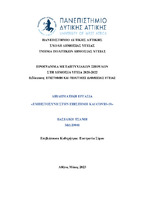| dc.contributor.advisor | Σίμου, Ευστρατία | |
| dc.contributor.author | Τσάμη, Βασιλική | |
| dc.date.accessioned | 2023-07-28T20:12:29Z | |
| dc.date.issued | 2023-07 | |
| dc.identifier.uri | https://polynoe.lib.uniwa.gr/xmlui/handle/11400/4904 | |
| dc.identifier.uri | http://dx.doi.org/10.26265/polynoe-4742 | |
| dc.description.abstract | Εισαγωγή: Το ξέσπασμα της πανδημίας COVID-19 στις αρχές του 2020 αποτέλεσε μια πρωτοφανή κρίση δημόσιας υγείας διεθνούς εμβέλειας, που ανέδειξε με μοναδικό τρόπο τη βαρύνουσα σημασία της εμπιστοσύνης των πολιτών στην επιστήμη και στους επιστήμονες. Ειδικότερα, αυξημένα επίπεδα εμπιστοσύνης σχετίζονται με υψηλή συμμόρφωση με τις κυβερνητικές οδηγίες για την πρόληψη μετάδοσης του ιού.
Σκοπός: Η παρούσα εργασία έχει ως κύριο σκοπό τη διερεύνηση του βαθμού εμπιστοσύνης στην επιστήμη στο πλαίσιο της πανδημίας COVID-19.
Μέθοδος: Πραγματοποιήθηκε περιγραφική συγχρονική μελέτη, με δείγμα ευκολίας και συλλογή δεδομένων μέσω δομημένου ερωτηματολογίου ο διαμοιρασμός του οποίου πραγματοποιήθηκε διαδικτυακά.
Αποτελέσματα: Το δείγμα περιλάμβανε 300 συμμετέχοντες με μέση ηλικία τα 36,9 έτη. Η πλειοψηφία ήταν γυναίκες (55,7%), απόφοιτοι ΑΕΙ (86,3%), άγαμοι (57%), εργαζόμενοι πλήρους απασχόλησης (66,3%) και διέμεναν στην Αθήνα/Θεσσαλονίκη (90%). Η εμπιστοσύνη των συμμετεχόντων στην επιστήμη και τους επιστήμονες ήταν μέτρια (μέση βαθμολογία 3,7), ενώ χαμηλή ήταν η πίστη τους στις θεωρίες συνωμοσίας για την COVID-19 (μέση βαθμολογία 1,2). Το 50% των συμμετεχόντων ήταν κυρίως φιλελεύθεροι, το 27,7% σταθερά φιλελεύθεροι, το 20,7% κεντρώοι και το 1,7% κυρίως συντηρητικοί. Οι συμμετέχοντες με υψηλότερο μορφωτικό επίπεδο είχαν μεγαλύτερη εμπιστοσύνη στην επιστήμη και τους επιστήμονες (p<0,001), ενώ ο εμβολιασμός κατά του κορωνοϊού συσχετίστηκε με υψηλότερα επίπεδα εμπιστοσύνης (p<0,001). Επιπλέον, το χαμηλότερο μορφωτικό επίπεδο (p<0,001) και ο μη εμβολιασμός (p<0,001) παρουσίασε συσχέτιση με αυξημένα επίπεδα πίστης σε θεωρίες συνωμοσίας για την COVID-19. Το υψηλότερο μορφωτικό επίπεδο (p=0,013), ο εμβολιασμός κατά του κορωνοϊού (p=0,002) και το γυναικείο φύλο (p<0,001) συσχετίστηκε με περισσότερο φιλελεύθερες στάσεις. Η αύξηση της εμπιστοσύνης στην επιστήμη σχετίζονταν με μείωση της πίστης στις θεωρίες συνωμοσίας για την COVID-19 (p<0,001) και με περισσότερο φιλελεύθερες στάσεις (p<0,001), ενώ αντιστρόφως η αύξηση της πίστης στις θεωρίες συνωμοσίας για την COVID-19 σχετίζονταν με περισσότερο συντηρητικές στάσεις (p<0,001).
Συμπεράσματα: Αναδεικνύεται η ανάγκη λήψης μέτρων για την ενίσχυση της εμπιστοσύνης του ελληνικού πληθυσμού στην επιστήμη μέσω ενημερωτικών εκστρατειών και στοχευμένων δράσεων. | el |
| dc.format.extent | 116 | el |
| dc.language.iso | el | el |
| dc.publisher | Πανεπιστήμιο Δυτικής Αττικής | el |
| dc.rights | Αναφορά Δημιουργού - Μη Εμπορική Χρήση - Παρόμοια Διανομή 4.0 Διεθνές | * |
| dc.rights.uri | https://creativecommons.org/licenses/by-nc-sa/4.0/deed.el | * |
| dc.subject | COVID-19 | el |
| dc.subject | Πανδημία | el |
| dc.subject | Κλίμακα Εμπιστοσύνης στην Επιστήμη | el |
| dc.subject | Ideological Consistency Scale | el |
| dc.subject | Κλίμακα Ιδεολογικής Συνέπειας | el |
| dc.subject | Pandemic | el |
| dc.subject | Trust in Science and Scientists Inventory | el |
| dc.subject | Trust in science | el |
| dc.title | Εμπιστοσύνη στην Επιστήμη και COVID-19 | el |
| dc.title.alternative | Trust in Science and COVID-19 | el |
| dc.type | Μεταπτυχιακή διπλωματική εργασία | el |
| dc.contributor.committee | Zavras, Dimitris | |
| dc.contributor.committee | Sergentanis, Theodoros N. | |
| dc.contributor.faculty | Σχολή Δημόσιας Υγείας | el |
| dc.contributor.department | Τμήμα Πολιτικών Δημόσιας Υγείας | el |
| dc.contributor.master | Δημόσιας Υγείας | el |
| dc.description.abstracttranslated | Title: “Trust in Science and COVID-19”
Introduction: The outbreak of the COVID-19 pandemic in early 2020 was an unprecedented public health crisis of international scope that uniquely highlighted the critical importance of public trust in science and scientists. In particular, increased levels of trust are associated with high compliance with government guidelines to prevent transmission of the virus.
The purpose of this research is to investigate the degree of trust in science in the context of the COVID-19 pandemic.
Method: A descriptive cross-sectional study was conducted, with a convenience sample and data collection through a structured questionnaire.
Results: The sample included 300 participants with an average age of 36.9 years. The majority were women (55.7%), university graduates (86.3%), single (57%), full-time workers (66.3%) and living in Athens/Thessaloniki (90%). 73% of participants had been diagnosed with coronavirus and 94% had been vaccinated against coronavirus. Participants' trust in science and scientists was moderate (mean score 3.7), while their belief in conspiracy theories regarding COVID-19 was low (mean score 1.2). Half of the participants were mostly liberal, 27.7% consistently liberal, 20.7% centrist, and 1.7% mostly conservative. Participants with a higher level of education had greater trust in science and scientists (p<0.001), while vaccination against the coronavirus was associated with higher levels of trust (p<0.001). In addition, lower educational level (p<0.001) and non-vaccination (p<0.001) were associated with increased levels of belief in conspiracy theories about COVID-19. Higher educational level (p=0.013), vaccination against coronavirus (p=0.002) and female gender (p<0.001) were associated with more liberal beliefs. Increasing trust in science was associated with decreased belief in conspiracy theories about COVID-19 (p<0.001) and with more liberal beliefs (p<0.001). Inversely, increased belief in conspiracy theories about COVID-19 was correlated with more conservative beliefs (p<0.001).
Conclusion: The findings highlight the need for measures aiming to strengthen the Greek population's trust in science through information/awareness campaigns and targeted actions. | el |
| dcterms.embargoTerms | 12 months | el |
| dcterms.embargoLiftDate | 2024-07-27T20:12:29Z | |


